Email marketing platforms like EmailOctopus and MailChimp are vital tools for small business owners looking to build their brand, engage customers, and drive sales. Choosing the right platform is crucial to ensure your communications reach inboxes and avoid spam filters, so you can build relationships and grow your subscriber base.
In this comprehensive EmailOctopus vs. MailChimp review, we compare the two platforms across key criteria like market position, ease of use, features, and pricing.
Our goal is to provide an objective, data-driven analysis to help entrepreneurs select the best email marketing solution for their unique needs and budget.
1. Understanding the Basics
EmailOctopus was founded in London in 2014 by Jonathan Bull. It has quickly grown in popularity as an easy-to-use email marketing platform for small businesses.
MailChimp was launched in 2001 in Atlanta by Ben Chestnut and Dan Kurzius. It has become one of the most widely-used email marketing platforms, known for its free plan for up to 2,000 subscribers.
Both tools have an established presence in the market, though MailChimp tends to dominate in terms of global brand awareness. EmailOctopus has a smaller but passionate user base.
In terms of online communities, EmailOctopus has an active Facebook page with over 1,900 followers for discussions and feedback. MailChimp also has a large Facebook community with over 13,000 members.
2. Features and Functionality
Automation
EmailOctopus

EmailOctopus offers robust automation with workflows and conditional logic to send targeted emails based on user actions. You can create sequences to onboard subscribers, trigger cart abandonment flows, and personalized lifecycle campaigns.
The visual workflow builder makes it easy to set up “if this, then that” rules with drag-and-drop blocks. For example, you can send a welcome series to new contacts or an automated follow-up to anyone who clicks a link in a campaign. Advanced options like filters, tags, wait steps, and multiple decision paths allow complex automation.
You can also connect EmailOctopus to your e-commerce platform or CMS to track purchases, content downloads, form submissions, and more to activate flows. It integrates with tools like WordPress, WooCommerce, Shopify, and Magento.
Mailchimp
MailChimp has powerful automation features with its workflow tool that helps you send the right message at the right time. Drag-and-drop workflow builder allows you to visually map out your customer journey and set up triggers based on subscriber actions.
Use case examples include sending an automated welcome series, win-back campaigns for inactive contacts, educational nurture tracks, and product abandonment flows. Advanced options include A/B testing workflow steps and options to clone existing automation.
The platform tracks e-commerce data from integrated stores to trigger post-purchase or abandoned cart workflows. CRM tools like Salesforce can also activate customer journeys when a contact hits certain lead score thresholds.
Winner: Mailchimp
MailChimp wins for its depth of advanced automation capabilities and auto-responders. The platform has a range of over 250 connected app integrations that can trigger customized sequences. It allows more complex decision trees and supports larger volumes of subscribers.
Email Templates
EmailOctopus

EmailOctopus provides professionally designed email templates to choose from in different categories like welcome series, sales, events, holidays, and more. Templates are mobile-optimized and the drag-and-drop editor makes it easy to customize fonts, colors, and layouts.
You can create free-form HTML templates from scratch or use the responsive boilerplates. For a customized brand look, upload your own templates or creative assets. Useful tools in the editor like global styling saved blocks, and reuse templates from other marketing or ad campaigns.
Automated tests check for rendering issues across different email clients and devices. Handy features like pops of color, dynamic content, and custom fields help elevate template design without coding knowledge.
Mailchimp
MailChimp offers hundreds of professionally designed email templates ranging from welcome series to product launches, newsletters, holidays, and more. Templates are optimized for all major email clients and mobile devices.
The drag-and-drop editor makes it easy to swap design elements like images, colors, and text to customize the look and feel. You can create basic templates from scratch or edit HTML/CSS source code for advanced customizations.
Useful template features include saved blocks, global styling options, A/B testing capabilities, and tools to preview how emails will look across different inboxes based on their specifications.
Winner: Tie
Both EmailOctopus and MailChimp provide ample professionally designed email templates to choose from and easy-to-use editing tools to customize the look and feel. They are on par when it comes to creating engaging, branded email templates for campaigns.
Segmentation
EmailOctopus
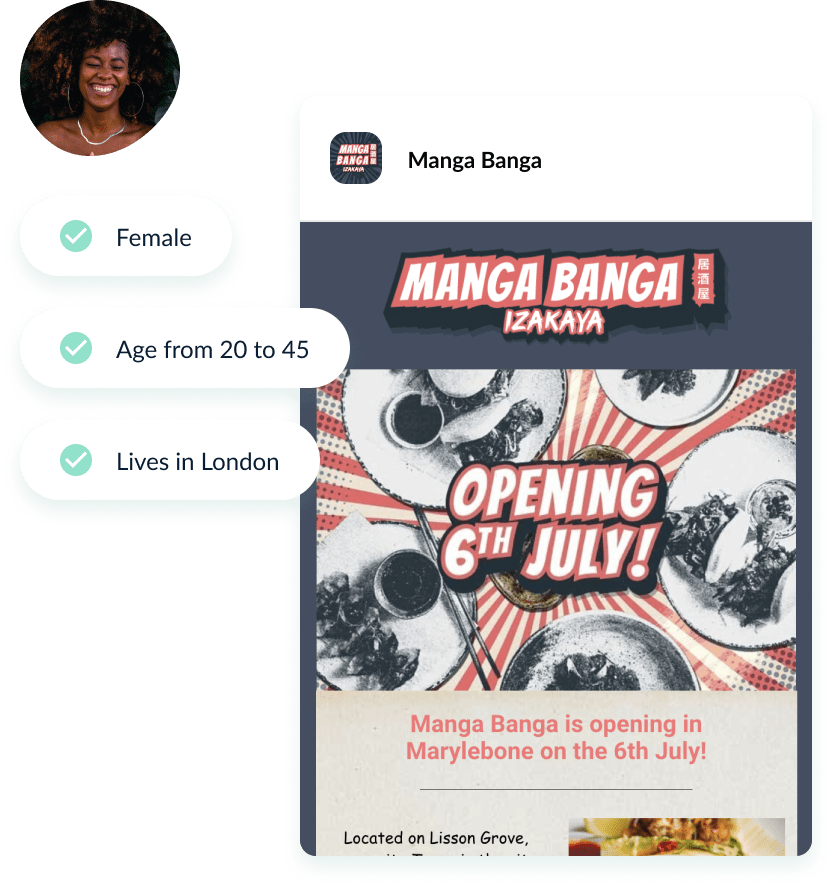
EmailOctopus allows you to segment your contacts based on categories like email activity, interests, purchased products, and more to target campaigns.
Create dynamic lists using filters based on data points like email opens/clicks, date subscribed, location, engagement with links, and custom field values. Static segmentation is also supported by manually tagging contacts or implementing sign-up checkboxes.
Integrations with e-commerce platforms allow segmentation by purchase activity. For example, target customers who purchased certain products or spend thresholds.
Advanced options include segmentation funnels to target people who meet multiple filter criteria. Overall, easy to build targeted lists for campaigns.
Mailchimp
MailChimp has powerful segmentation tools to group contacts using categories like demographics, email activity, purchase history, and more. Segmenting options allow both basic and complex targeting.
Create static groups by applying tags or interest groups which subscribers can opt into upon sign up. Build smart dynamic groups using complex filters based on account profile info, purchase activity, email engagement metrics, and connected CRM data.
E-commerce reports from integrated stores allow segments for high-value customers, best-selling products, repeat buyers, etc. Advanced options include segments sharing common traits and combining multiple groups.
Winner: Mailchimp
MailChimp wins for segmentation due to the ability to build highly advanced groups using multiple data types and complex logic funnels between dynamic and static segments. Granular targeting is overall stronger.
Analytics
EmailOctopus
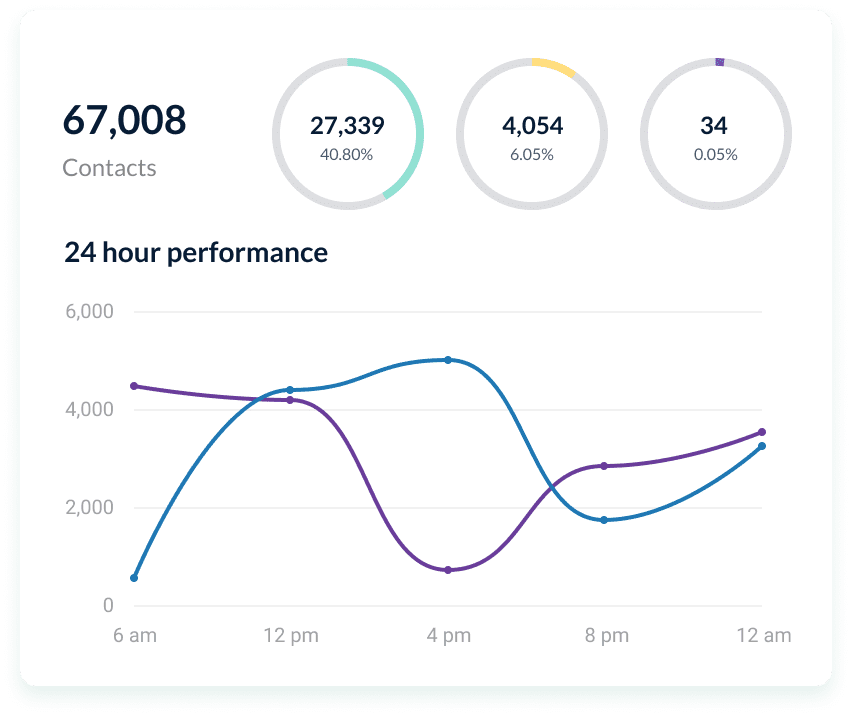
EmailOctopus provides detailed analytics to track email campaign performance. View reports on opens, clicks, unsubscribes, spam complaints, and bounce rates. Data can be segmented by campaign, issue, location, device type, and more.
Other key metrics cover subscriber engagement over time, ROI tracking via sales and conversion data, and email shareability stats. Useful features like A/B testing campaign elements and heat mapping links clicked.
The tool highlights top-performing segments, most engaging subject lines, and send times, and provides actionable advice to continually optimize campaigns. Easy to drill down into reports to understand subscriber behavior.
Mailchimp
MailChimp has powerful analytics featuring pre-built and custom reports to provide insights into email campaigns, automation, segments, and overall account metrics.
The track opens, clicks, unsubscribes, and spam complaints down to the individual user level. View time series charts for engagement trends over custom date ranges. Useful features like subject line and send time optimization tools, campaign comparison, and detailed demographic reporting.
For e-commerce customers, additional data on customer lifetime value, average order value, ROI, repeat purchase rate, and more. Reliable analytics to help improve email targeting and performance.
Winner: Mailchimp
MailChimp wins for its breadth of detailed email and account analytics. The platform supports more complex reporting with additional e-commerce and segment-focused dashboards for large sender accounts. Provides maximized transparency into subscriber engagement.
Unique Features
EmailOctopus
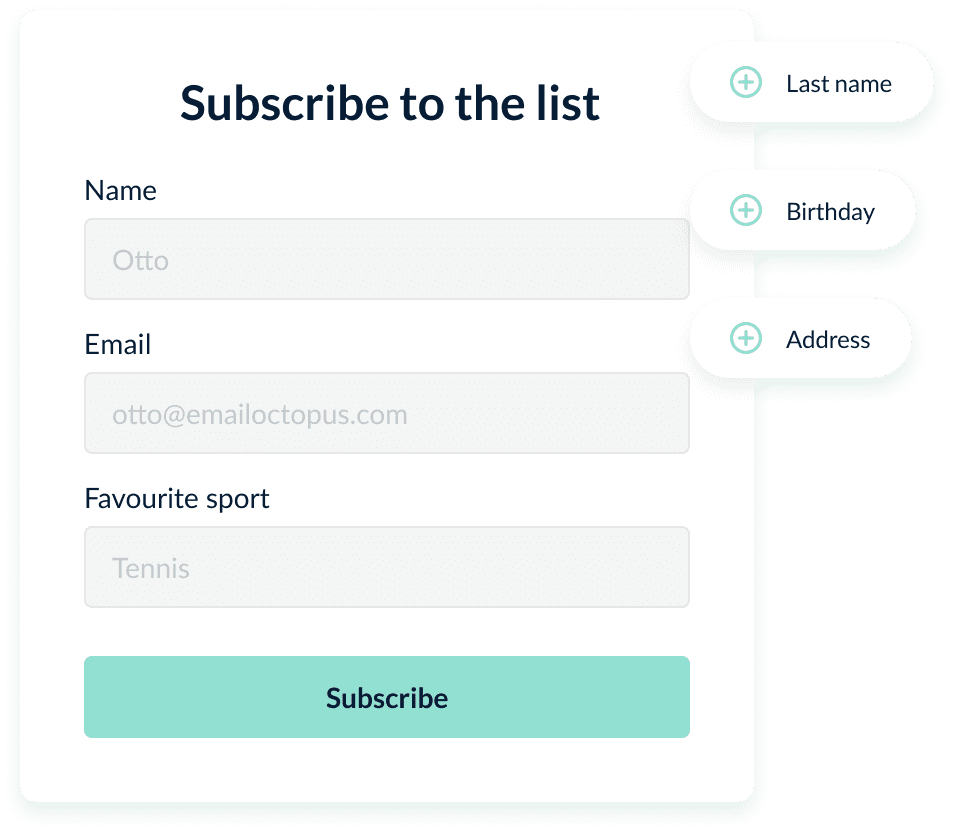
EmailOctopus has a few unique capabilities that set it apart. One is a built-in free web pop-up form to help capture more subscriber emails without needing coding experience to add to your site.
It also provides SMS messaging functionality out of the box to engage your audience across multiple channels. A planning calendar helps you map out your content schedule in one place.
Useful features like built-in contest & giveaway tools, Facebook remarketing, and A/B testing to continually optimize performance. EmailOctopus also offers phone support with all paid plans.
Mailchimp
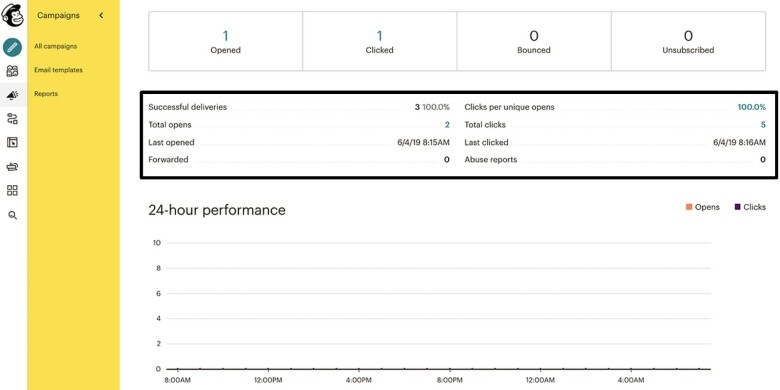
MailChimp has some differentiated features like automated chatbots to qualify sales leads, build one-on-one relationships at scale, and nurture contacts toward conversion.
It also provides social posting & scheduling to expand audience reach and campaign visibility across multiple digital channels beyond email into Facebook, Twitter, Linkedin, and more.
Other unique capabilities include built-in surveys to gather first-party data, custom onboarding guidance for implementation, and predictive subject line tools powered by artificial intelligence.
Winner: Mailchimp
MailChimp wins for unique features due to the breadth of marketing solutions beyond just email like social posting, chatbots, and surveys that can amplify campaign results. Provides more tools to maximize reach and conversions.
3. Ease of Use
EmailOctopus
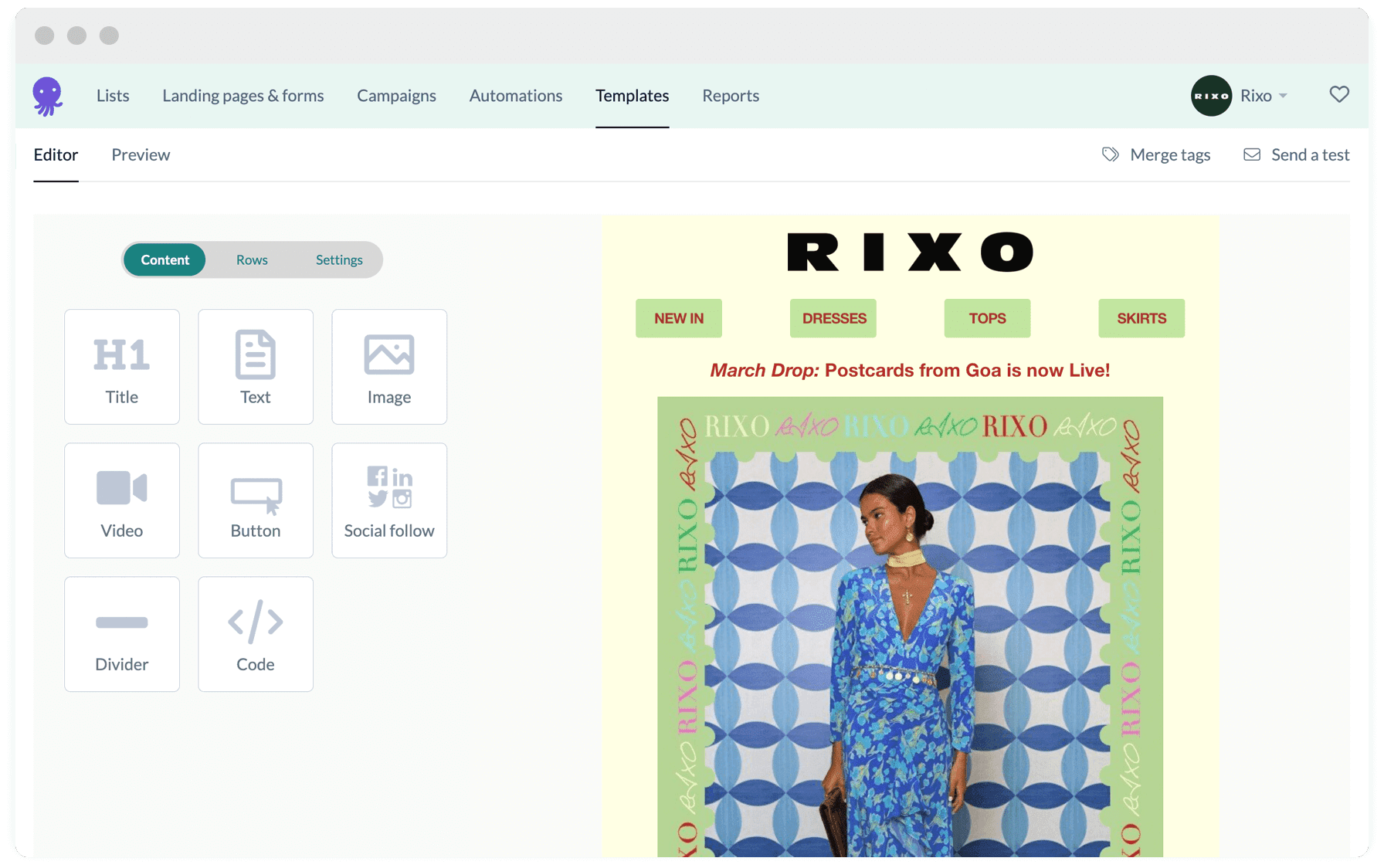
EmailOctopus has an intuitive user interface with a drag-and-drop editor that makes it easy for beginners to create campaigns, set up automation, and view analytics without much learning curve.
The platform is designed for simplicity – you can start building subscriber lists, customized forms, and emails within minutes of signing up. Contextual in-line help and product tours guide new users.
Menu layouts and workflows are clean, logical, and user-friendly. Settings and options are well-labeled so both basic and advanced configuration is self-explanatory without much need for outside help docs or tutorials.
Overall EmailOctopus offers a quality user experience that lowers barriers to effective email marketing for small business owners and creators.
Mailchimp
MailChimp prioritizes ease of use with key features such as a highly intuitive drag-and-drop interface and pre-built template options that allow both novice and experienced senders to create professional emails quickly without coding skills.
The platform guides you through initial account setup and has an easy list-building wizard. Contextual help menus and prompt user tips aid the learning process. Menu navigation and logic flows make intuitive sense.
Extensive help documentation and e-commerce implementation resources reduce the need for outside support. As one of the first self-serve email platforms, MailChimp focuses heavily on usability and simplicity.
Winner: Tie
This Mailchimp EmailOctopus comparison shows that both platforms invest in intuitive interfaces, simplified workflows, drag-and-drop functionality to save time. They also have self-guided education so anyone can create email campaigns regardless of technical skill level. They tie for top ease of use.
4. Email Deliverability
EmailOctopus
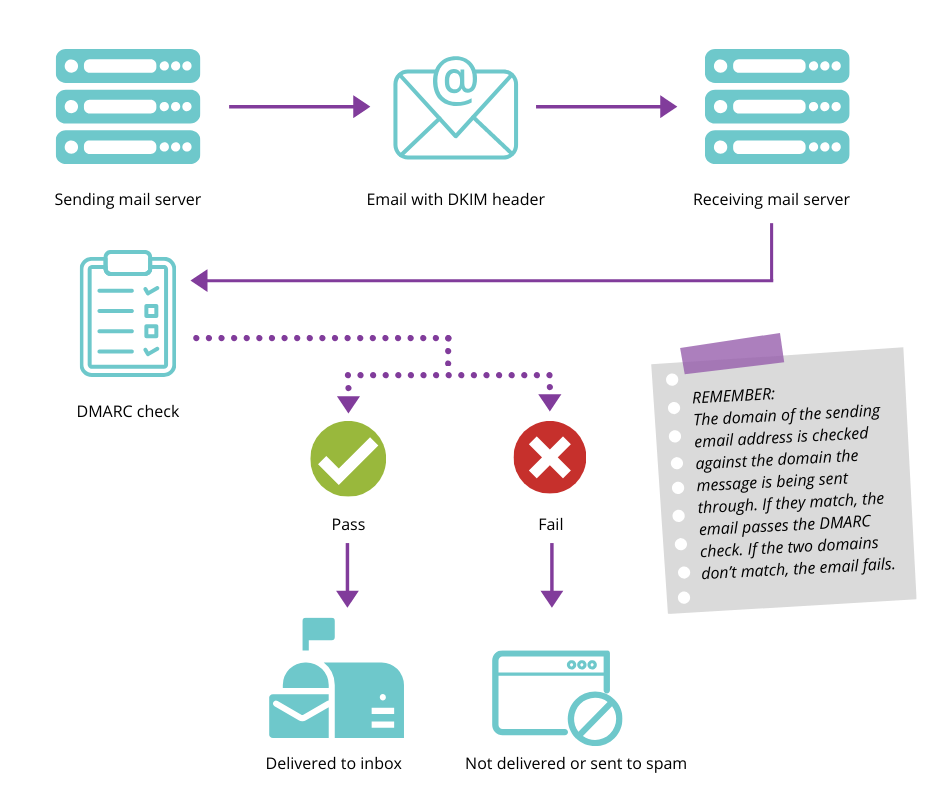
EmailOctopus focuses heavily on deliverability with advanced tools to help emails reach the inbox and avoid spam folders. Send reputation is monitored closely.
Features like link wrapping, traffic analysis, and historical performance data identify risky links. Unsubscribe groups ensure contacts don’t receive irrelevant content. List cleaning identifies inactive subscribers.
A dedicated deliverability team hand-checks spam test scores across major ISPs to optimize sender practices. Useful deliverability reports provide sender, domain, and campaign-specific metrics to maintain health.
Mailchimp
MailChimp prioritizes deliverability across its global sending infrastructure and provides visibility into account reputation. Extensive reporting helps optimize for inbox placement.
Proprietary algorithms predict subscriber engagement to identify inactive contacts for removal. Automated list audits and hygiene monitoring prevent issues proactively.
In-depth campaign analytics track spam complaints bounces, and opt-outs. Granular ISP-level insights show where emails are landing to improve performance. Deliverability experts review accounts regularly.
Winner: Mailchimp
MailChimp wins for better email deliverability through its analytics and infrastructure designed to maximize email reach, inbox placement, and relevancy for subscribers. Continued investment keeps its leading edge.
5. Customer Support and Community
EmailOctopus
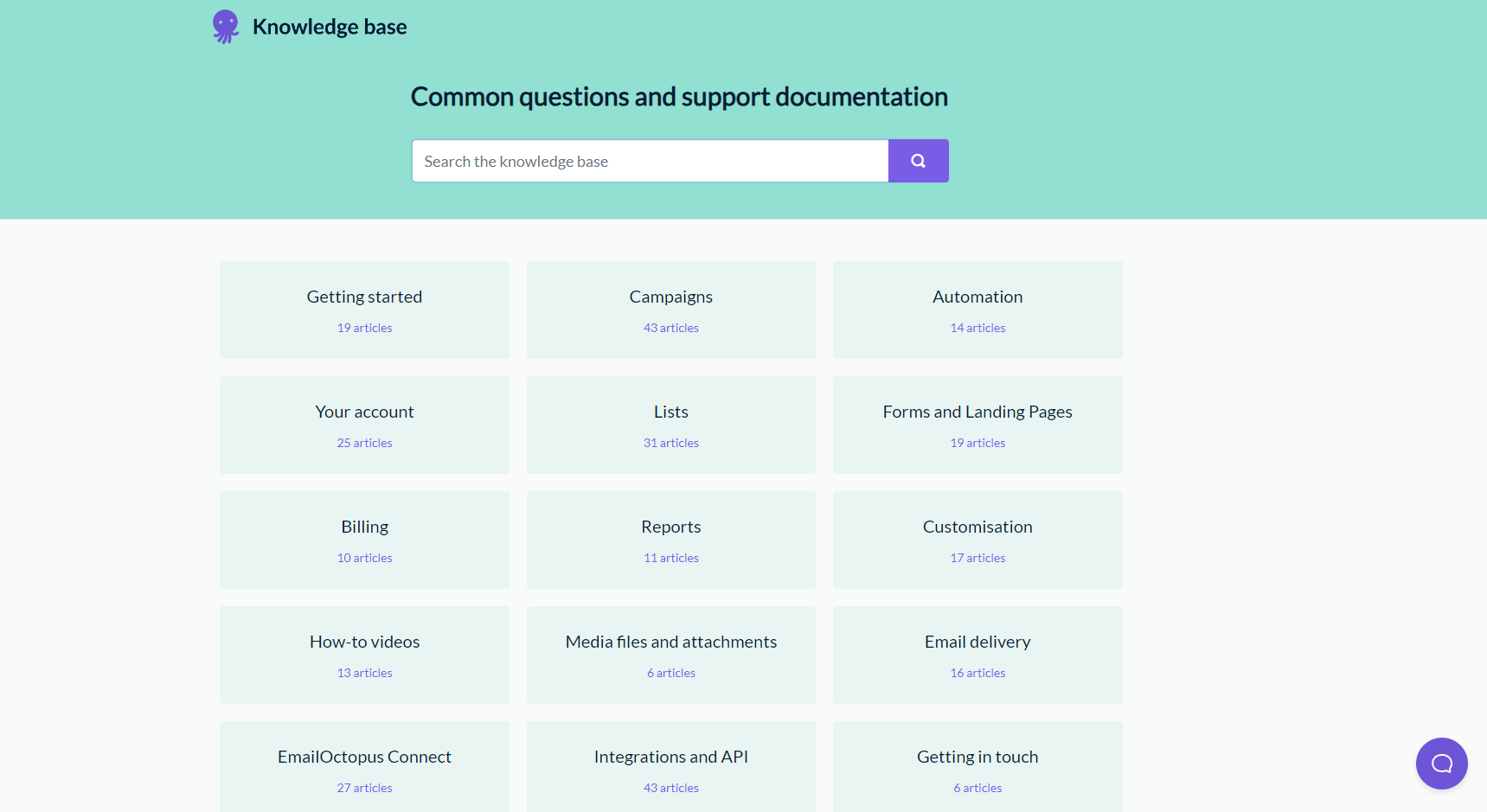
EmailOctopus offers email-based customer support as well as phone and chat support on all paid plans. Its support team has an average response time of under 5 minutes. Agents are technical and offer thorough guidance.
To augment support, EmailOctopus provides webinars, an e-learning academy, and tutorial videos that teach beginners email marketing best practices. There is also a help center with FAQs.
The platform has an active Facebook User Group with over 7,000 members available for community-based advice and discussions:
Mailchimp
MailChimp has 24/7 email support with initial response times averaging less than 1 hour. The platform also offers live chat support and 1-on-1 phone-based training sessions, especially for larger or mid-market accounts.
Extensive self-serve resources include hundreds of how-to articles and step-by-step guides in the platform’s e-commerce-focused Knowledge Base. Video tutorials are also available through MailChimp University.
In terms of community, MailChimp is best-in-class given its longevity in the email marketing space. Its Facebook Group has over 140,000 marketers sharing insights, some with over 10 years on the platform.
MailChimp Facebook Group
The group is a helpful source of shared knowledge for troubleshooting, feedback, and tips. A boon for new users to learn from.
Overall MailChimp offers more resources to educate and empower customers through multiple avenues – whether self-guided content or its active online community.
Winner: Mailchimp
MailChimp is the winner for customer support and community given its live support and longer-tenured depth of knowledge base and a 13K+ person Facebook group where members openly share advice and best practices to aid fellow marketers.
6. Integrations
EmailOctopus

EmailOctopus connects with key platforms like WordPress, Shopify, WooCommerce, and Magento for capturing email signups right from your website alongside existing payment and data flows.
Other software integrations support lead generation and list growth like embedding forms on landing pages made with Instapage, Leadpages, and Unbounce. Streaming subscription data from services like ConvertKit and Drip can trigger automation workflows.
For cross-channel coordination, EmailOctopus partners with live chat tools like Drift and Intercom to build unified CX. It also offers Zapier and Integromat to build custom integrations across over 1,000 apps.
Mailchimp
MailChimp features over 250 technology integrations, with deep support for all major e-commerce platforms, CRMs, marketing apps, and popular web builders.
Native integrations with WooCommerce, Shopify, Magento, and others capture store data to activate orders, and sync product catalogs to enrich email campaigns with dynamic content.
CRM platforms like Salesforce, Zoho, and Microsoft Dynamics can activate automated campaigns when contacts meet lead score thresholds or take defined actions for more personalized messaging.
MailChimp also offers a custom integration tool and Zapier partnership for easily connecting other marketing, sales, and web apps. You can also connect to compliance tools, productivity tools, etc. for both mobile and Windows. This facilitates more streamlined data flows and harmonized CX across channels.
Winner: Mailchimp
MailChimp comes out ahead on key features for integrations, making it one of the best alternatives to Emailoctopus for businesses that want more features.
The service has been around longer and its position in the industry has allowed the development of more robust first and third-party integrations – over 250 and counting – to unify data and coordinate messaging across key business systems used by its customers at scale. It also offers robust data security integrations so you can secure your information and have peace of mind.
7. Pricing
EmailOctopus
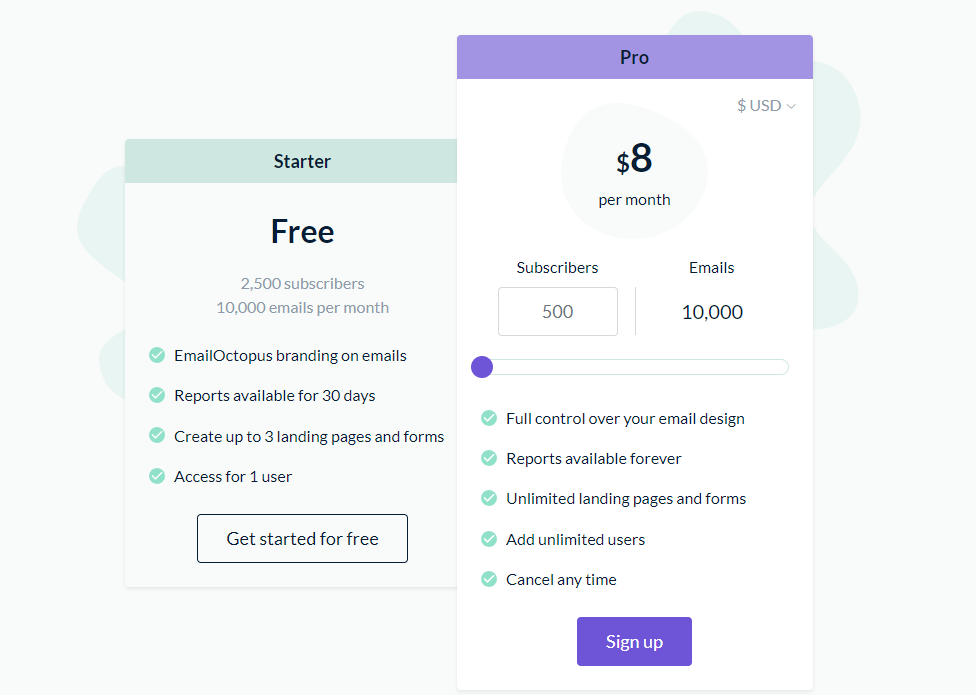
EmailOctopus pricing starts free for up to 2,500 subscribers. The price for its Pro plan is $8/month (when billed annually) and allows you to send up to 10,000 emails.
The plan also comes with advanced features like automation and surveys. An Enterprise custom plan offers high-volume sending.
Overall EmailOctopus is cheaper for solopreneurs, side hustlers, and small teams to grow their business and subscriber list. Easy startup costs make professional email marketing accessible.
Mailchimp
Mailchimp has 3 pricing tiers:
- Free – Up to 2,000 subscribers and 12,000 emails/month
- Essentials – $13/month billed annually for up to 500 contacts
- Standard – $20/month billed annually for up to 2,500 contacts
- Premium – $350/month billed annually for up to 10,000 contacts
Add-ons like additional email sends, domain authentication and SMS credits cost extra.
MailChimp positions itself as an enterprise-level solution focused on expanding e-commerce capabilities for growing SMBs. Higher-volume plans unlock more premium tools, dedicated support, and deliverability assurances.
Winner: EmailOctopus
EmailOctopus wins on pricing with very approachable subscription rates for small businesses and individuals through its Pro plan. MailChimp grows more affordable at its highest tiers but starts costlier for those with smaller lists. EmailOctopus has a broader appeal.
8. Reviews and Reputation
EmailOctopus
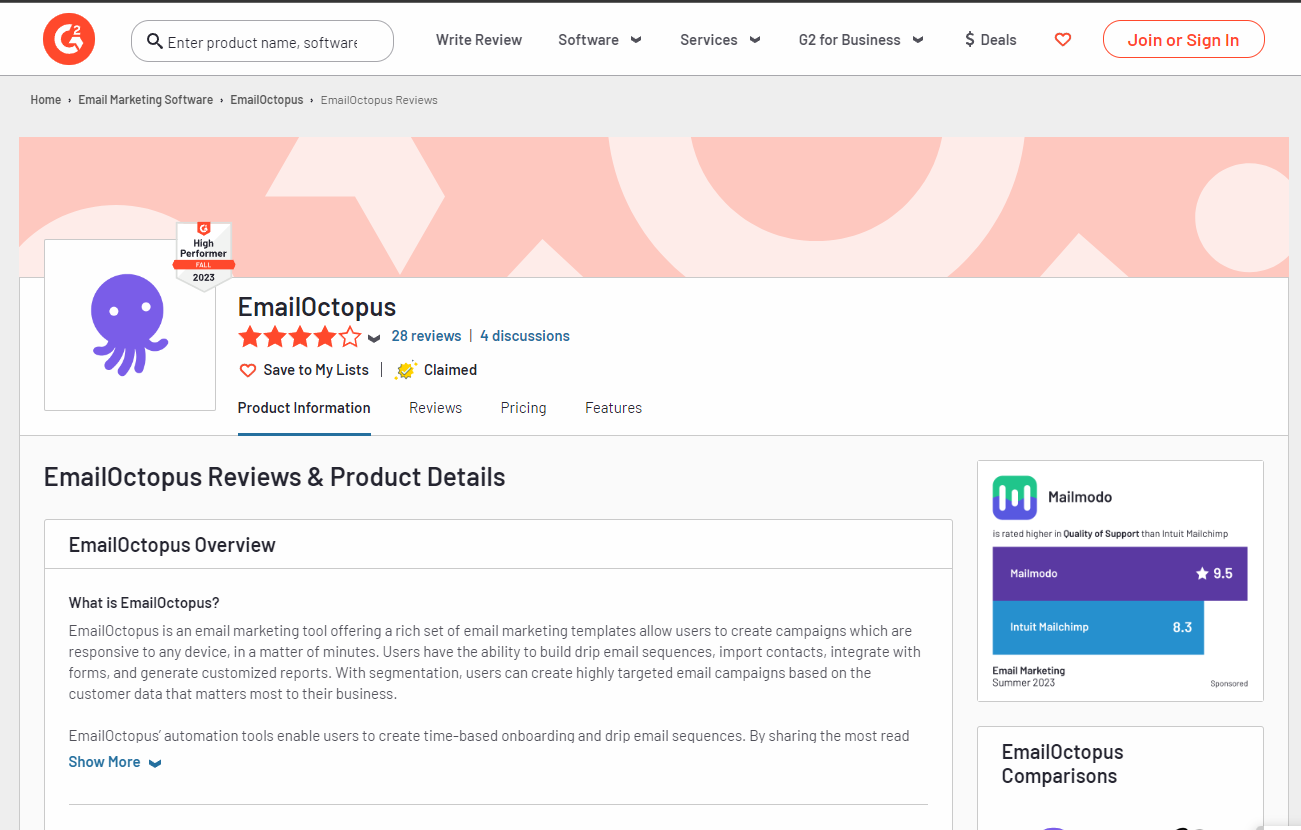
EmailOctopus earns positive reviews for its ease of use, excellent customer support, and affordability aimed at small business owners. Users praise its intuitive drag-and-drop editor, customizable templates, and valuable automation features.
Constructive feedback indicates the platform could benefit from more advanced analytics. The smaller company is still building its feature sets. Some enterprise marketers may seek more complex functionality, but most reviewers say EmailOctopus provides fantastic value.
In terms of reputation, the tool is well-liked by its target solo entrepreneur and small business user base. However, as a newer entrant, EmailOctopus does not share the mainstream brand recognition of some legacy players.
See EmailOctopus Reviews on G2
Mailchimp
With over 20 years in business, MailChimp enjoys strong brand visibility and loyalty from many customers. Praise focuses on its rich email functionality, automation capabilities, and expanding integrations with sites and sales tools.
Users also appreciate the education around deliverability best practices to maximize reach and engagement. Constructive feedback indicates its expanded enterprise pricing leaves some small business buyers wanting more affordable plans.
The tool is a leader in familiarity—most have heard of MailChimp even if they have not used it directly. It earns recommendations for helping elevate email marketing sophistication.
Winner: Mailchimp
MailChimp emerges as the reputation leader given its 20-year track record and widespread familiarity in the email marketing and e-commerce ecosystem. Both have supporters, but MailChimp has greater exposure over time.
9. FAQ’s
EmailOctopus FAQs
- What is the maximum number of contacts supported on EmailOctopus?
EmailOctopus supports up to 50,000 contacts on its paid Enterprise plan. Lower tiers allow up to 10,000 subscribers. - Can I connect EmailOctopus to my e-commerce store?
Yes, EmailOctopus offers native integrations with e-commerce platforms like WooCommerce, Shopify, and Magento to capture store data. - Does EmailOctopus have automation workflows?
Yes, you can set up automated email sequences triggered by subscriber behaviors like opening emails, clicking links, making purchases, and more. - Is there A/B testing for email campaigns?
Yes, EmailOctopus supports split testing for subject lines, email content, scheduling, and segments.
Mailchimp FAQs
- How many contacts can I have on Mailchimp?
Mailchimp supports up to 100,000 contacts on its Standard plan, then scales up into the millions across paid tiers. - Can I sell products through Mailchimp emails?
Yes, Mailchimp integrates robustly with all major e-commerce platforms. You can merchandise products directly through emails. - Is there multilingual support?
Yes, Mailchimp lets you create campaigns in multiple languages and set subscriber preferences for language. - Does Mailchimp offer chatbots?
Yes, Mailchimp recently launched chatbot capabilities to engage website visitors and qualify leads.
Final Thoughts
Choose EmailOctopus if…
EmailOctopus is a great choice for solopreneurs, entrepreneurs, side hustlers, and small teams who want to grow their list and establish professional email marketing campaigns without heavy startup costs or complexity.
It makes high-quality email easy and accessible for less technical users, with a smooth learning curve for beginners but enough tools to create beautiful, engaging messages that drive results. For those with smaller lists below 10,000 subscribers who want great value without sacrificing core functionality, EmailOctopus delivers.
Choose Mailchimp if…
MailChimp caters best to established small businesses ready to scale their customer engagement through sophisticated auto-responders and features like customer journeys, and integrations with e-commerce stores and sales platforms.
The wider array of email functionality, larger community, and more analytics make MailChimp ideal for larger email lists above 10,000 subscribers managed by mid-market brands, agencies, and enterprises invested in maximizing deliverability and fine-tuning data-driven targeting.
You may also be interested in checking out some Mailchimp alternatives to help with the evaluation process.
